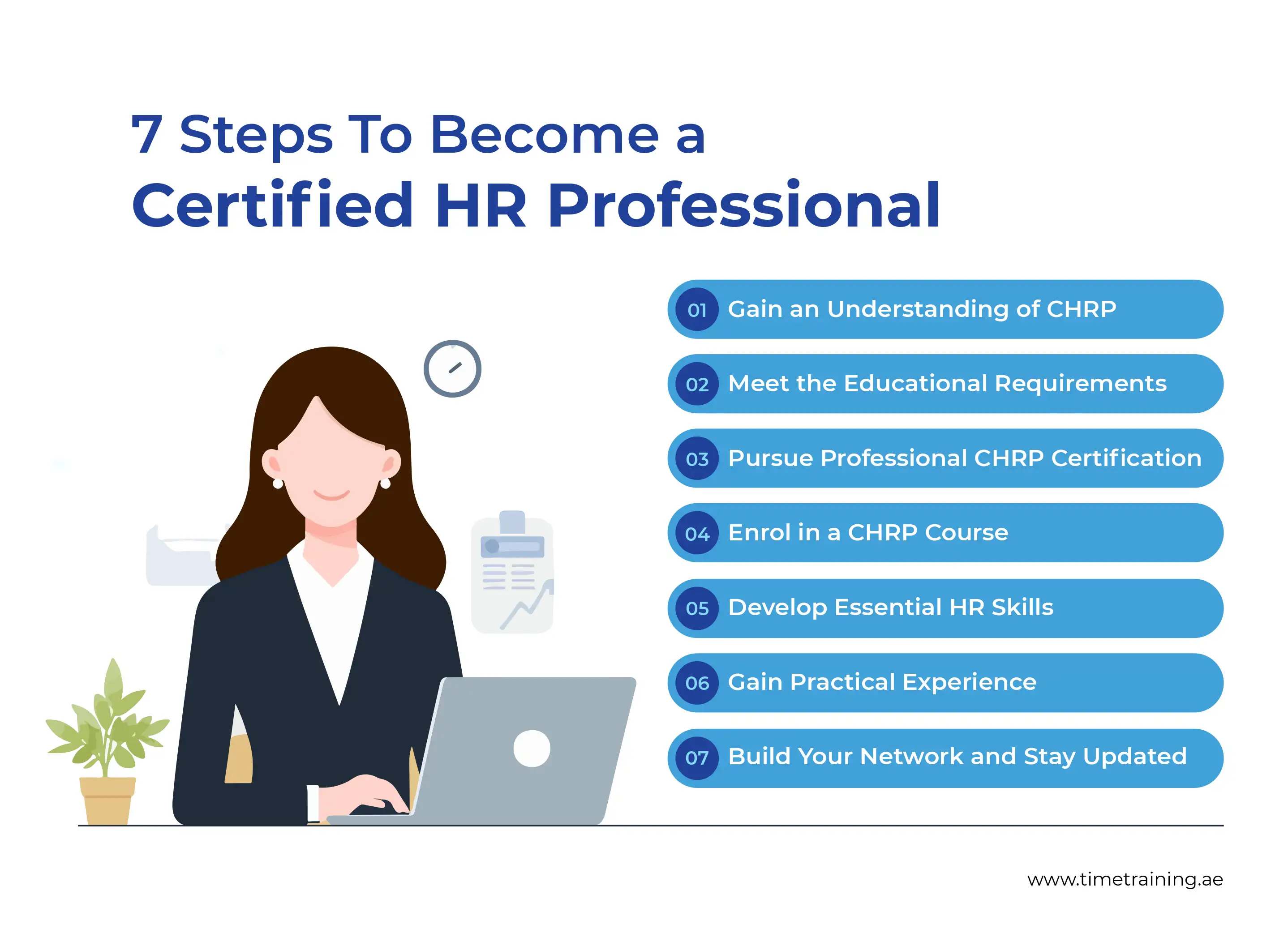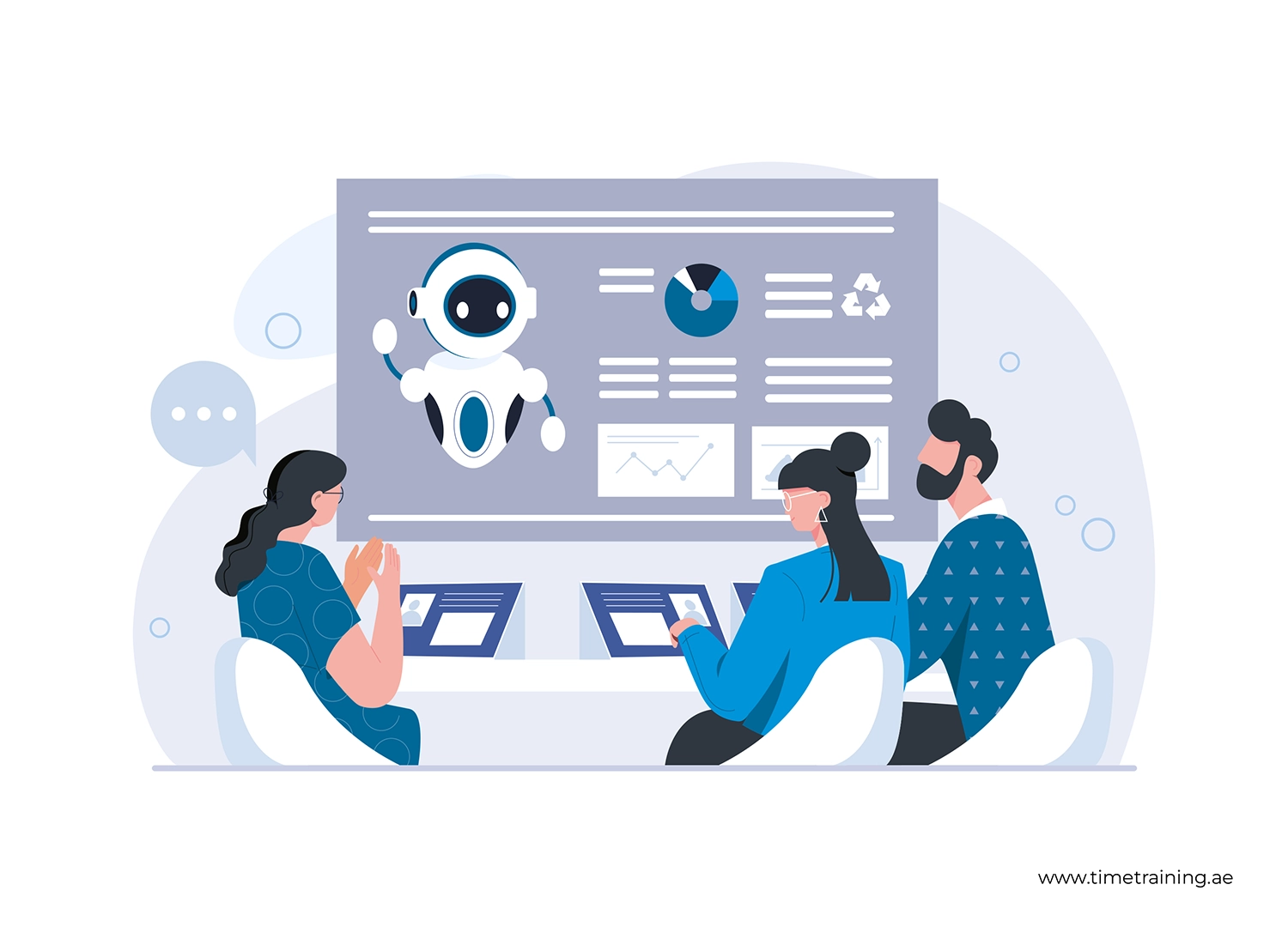To become a Certified Human Resource Professional (CHRP), you must complete a multiple-step process that includes earning a relevant degree, attending a CHRP training, and gaining an HR certification.
The Certified Human Resources Professional (CHRP) designation is globally recognised and opens doors to exciting HR career opportunities. It is also one of the most sought-after HR certifications today by early career boomers. So if you’ve decided to pursue the CHRP certification, congratulations! You have made the right decision!
According to the US Bureau of Labor Statistics, the employment of human resources managers is projected to grow 6 percent from 2023 to 2033, faster than the average for all occupations. The average base salary of a CHRP-certified professional is around $62,000 per year.
7 Steps To Become a Certified HR Professional
HR is a rewarding field, and this step-by-step guide will guide you with a clear CHRP career path to becoming a successful certified HR professional.
-
Step 1: Gain an Understanding of CHRP
-
Step 2: Meet the Educational Requirements
-
Step 3: Pursue Professional CHRP Certification
-
Step 4: Enrol in a CHRP Course
-
Step 5: Develop Essential HR Skills
-
Step 6: Gain Practical Experience
-
Step 7: Build Your Network and Stay Updated
1. Gain an Understanding of CHRP
The CHRP (Certified Human Resources Professional) is a benchmark certification for HR professionals. The CHRP designation validates an individual's knowledge of human resources, workplace readiness, and commitment to continuous professional development. The roles and responsibilities of a CHRP professional vary according to the organization or industry they are working for. Typically, the roles and responsibilities of HR professionals include;
-
Talent Management
-
Compensation and benefits
-
Training and development
-
Employee Relations
-
Implementation Of Policies And Procedures
-
Recruitment and Planning
-
Performance management
-
Payroll, Benefits, and Compensation Management
As an HR professional, you will be the link between the company and its employees, handling sensitive issues while fostering a positive work environment. Currently, employee monitoring software and the use of AI, allow human resources professionals to perform their duties with greater accuracy, efficiency, and ease.
2. Meet the Educational Requirements
To become a highly paid HR, having a solid educational foundation is crucial. Here are some useful educational qualifications to become an HR:
-
Undergraduate program: You can kickstart your journey with degrees like a BA or BSc in Human Resource Management or Business Administration.
-
Postgraduate Degrees: To climb higher in your career, consider advanced programs like an MBA in HR or an MSc in Organizational Behavior.
-
Diploma: A diploma from a recognised institute will also suffice for you to receive a CHRP certification.
Typically, you do not need to have a postgraduate degree to start an HR career. However, having it can help you stand out among your peers. You can also start your career in HR by gaining recognized professional certifications in human resources.
Read Also : How to Become an HR Analytics Professional in Abu Dhabi
3. Pursue Professional CHRP Certification
Pursuing CHRP certification helps you obtain the requisite skills and competencies to fit into a variety of HR job roles. The CHRP certification is designed for both freshmen and experienced HR professionals. Getting certified in CHRP establishes credibility and demonstrates your workplace competency. Thus, CHRP certification elevates your status in the HR profession and helps you get ahead in your career.
The CHRP is recognized globally, making it a significant asset in the HR field. Over time, the CHRP designation has evolved to reflect the changing demands of the workplace and the HR profession. The CHRP requires ongoing professional development, ensuring that designees stay updated with the latest HR trends and practices.
4. Enroll in a CHRP Course
Preparing for an HR career path requires a structured approach. Enroll in a reputable HR training program that provides the best Certified HR Professional course. A high-quality Certified Human Resource Professional (CHRP) training will help you establish yourself as a Certified HR Professional.
For instance, the Time Training Center offers the finest CHRP training in Abu Dhabi. This CHRP training program is appropriate for both newcomers to the human resources field and those with 2-3 years of experience. Time’s CHRP training provides;
-
Self-paced modules, covering all key areas of HR and employment law.
-
Practice the exam to familiarize yourself with the question format.
-
Industry-led expert trainers
-
Flexible training schedule
Certified Human Resource Professional training equips you with the necessary skills and competencies to work in SMEs and MNCs. Here are a few job roles that you can consider pursuing after completing CHRP training:
-
HR Generalist
-
HR Business Partner
-
HR Operations
-
Human Resources Assistant
-
Staffing Coordinator
-
Human Resources Specialist
-
Human Resources Coordinator
5. Develop Essential HR Skills
Developing essential HR skills is an important aspect of becoming an HR professional. Every day, HR professionals handle a variety of tasks. This can be recruiting and hiring new candidates or handling employee conflicts. As a result, mastering a wide range of workplace skills is crucial. This includes both technical skills and soft skills. These skills enable you to collaborate effectively and manage responsibilities confidently. Improving these skills can also make you more appealing to employers.
Core competencies of an HR professional typically include;
-
Strong communication and interpersonal skills
-
Empathy and Emotional Intelligence
-
Problem-solving and conflict resolution
-
Organisational and time-management skills
-
Knowledge of labour laws and HR software
-
Confidentiality and decision-making skills
-
Leadership abilities and business acumen
-
Talent acquisition and retention
-
Critical thinking and ethical practice
-
Data analysis
6. Gain Practical Experience
-
Pursue Internships: Internships are one of the most effective ways to gain hands-on experience in HR. Many MNCs like Accenture, JPMorgan Chase, IBM, and Deloitte offer internship programs specifically for HR roles.
-
Take Entry-Level HR Roles: Starting with entry-level positions in HR or labor relations departments can provide valuable exposure to the field.
Here are a few entry-level HR roles that you can consider pursuing:
-
Human Resources Assistant
-
HR Coordinator
-
Recruitment Coordinator
-
Payroll Specialist
-
Volunteer Outside of Work: Volunteering for HR-related roles in non-profit organizations or community groups is a good way to build experience.
-
Leverage Education Opportunities: While pursuing a degree in HR or a related field, look for part-time or summer employment in HR departments.
Following the above-mentioned strategies can help you build the practical experience needed to excel in the HR field, even if you're starting without prior experience.
7. Build Your Network and Stay Updated
Building your network and staying up-to-date with the current industry trends can also help you break into the field of HR.
To achieve this, you can choose to attend industry conferences, join professional organizations like SHRM, and connect with HR professionals on LinkedIn. Building relationships can open doors to mentorship, job opportunities, and valuable insights into the field. Don't be afraid to reach out to people for informational interviews.
Furthermore, the HR landscape is constantly evolving. Stay current with the latest trends in employment law, technology, and best practices. Read industry publications, attend webinars, and engage in continuous learning to ensure your skills remain relevant. Lifelong learning is essential in this dynamic field. Here are a few ways that you could try to stay updated on HR trends and laws:
-
HR policies and labor laws frequently change. Stay informed through:
-
HR-related blogs and websites
-
Webinars and online courses
-
Government labour law portals

Bonus Point
Keep an Eye on Upcoming Career Opportunities in HR
The HR field is broad, with various specializations including talent acquisition and benefits, learning and development (L&D), HR Business Partner (HRBP), employee relations, and HR analytics. These HR job specializations cater to different interests and skills. Understanding these specializations can help you target your job search and develop expertise in a specific area.
HR professionals are needed in every industry, including technology, healthcare, education, finance, government, and non-profit organizations. However, certain sectors may offer more opportunities or higher salaries. Consider targeting industries that align with your interests and skills. HR offers a clear path for career advancement, from entry-level positions to executive leadership roles:
-
Entry-Level Roles: HR Assistant, HR Coordinator, Recruiter
-
Mid-Level Roles: HR Generalist, HR Business Partner, Compensation and Benefits Manager, Training Manager
-
Senior-Level Roles: HR Director, VP of HR, Chief Human Resources Officer (CHRO)
Check out : How a CHRP Certification Can Boost Your HR Career
Get Ready for an HR Career with the Best HR certifications
A career in human resources (HR) offers diverse opportunities to impact organizations and employees. To excel in the HR field and demonstrate your expertise, obtaining relevant certifications is crucial. HR certifications validate your knowledge, skills, and experience, making you a more competitive and valuable asset.
-
Certified HR Professional (CHRP)
-
Certified HR Manager (CHRM)
-
Compensation & Benefits
-
HR Strategic Planning
-
UAE Labour Law
-
Performance Appraisal
-
Key Performance Indicator (KPI)
Now that you understand how to become a Certified Human Resource Professional (CHRP) easily, the next step is to take action and align your career goals with the right certification path.
 +971 2 6713828
+971 2 6713828





